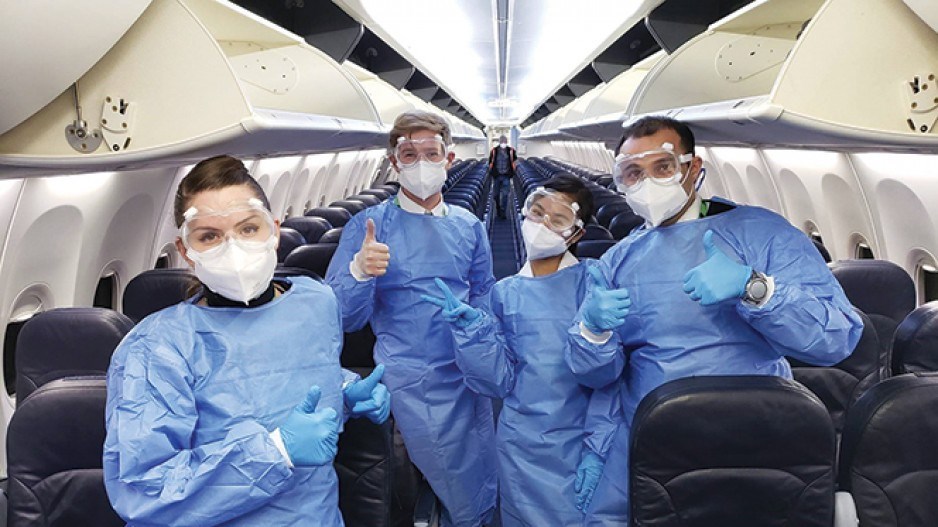Air travel is likely to change when governments lift travel restrictions aimed at reducing the spread of COVID-19, and public confidence recovers.
Most major airlines already ask passengers before they board how they feel, and require all passengers and crew to wear masks during flights. Seats and screens are wiped with disinfectants that airlines say stay active on surfaces, killing viruses for up to 10 days. Some also require passengers' hands be sprayed with sanitizer when boarding.
Hand sanitizer stations may also be prevalent at airports, which are now operating at a shadow of what is normal, and are likely to do so for some time.
Even at Abbotsford International Airport, where most flights are domestic, general manager Parm Sidhu said operations are running at about 15 per cent capacity.
The hit to airport revenue prompted the Canadian Airports Council to warn that airport improvement fees could rise 50 per cent.
There are no plans for fee increases at Vancouver International Airport "at this time," Vancouver Airport Authority (VAA) said spokesman Brock Penner. That may change, however, given that the VAA today announced that starting July 1 it will have a new CEO: Tamara Vrooman.
The VAA declined to comment on exactly how YVR would open up its facilities or which parts of terminals would open first, saying in a statement that such projections are "a few weeks off."
What is clear is that the aviation and travel sectors will struggle.
"We're now moving through the darkest period ever in the history of commercial aviation-significantly worse than the aftermath of 9-11, SARS, and the 2008 financial crisis," Air Canada CEO Calin Rovinescu said on a May 4 conference call.
Berkshire Hathaway Inc. CEO Warren Buffett a day earlier explained that this was why his company recently sold its about 10 per cent stakes in each of the four largest U.S. airlines. He said that even if airline load factors get up to the 70 per cent range, they will have more than enough planes to meet that demand.
Air Canada and WestJet last year profitably operated with their planes around 82 per cent to 84 per cent full.
To get a sense of current load factors, Flair Airlines CEO Jim Scott said his airline's flights fell to 10 per cent of capacity, or load factor, on March 27, down from an 87 per cent load factor nine days earlier. That proportion has since risen to around 50 to 60 per cent, he said.
John Korenic, University of British Columbia adjunct professor in aviation management, said that airlines may keep middle seats empty to better separate passengers, thereby chopping their maximum potential load factor by about a third.
They would need to be at least above 70 per cent capacity to break even, but they may operate with less than that once restrictions start loosening because they would still be making more money than if they had kept all their planes on the ground, he said.
Airline executives and analysts say cargo volume has risen during the pandemic. Air Canada has taken seats out of some passenger planes to make them cargo-only, while Flair debuted cargo service.
Post-pandemic, cargo volume is likely to fall back to nearly what it was, said Korenic. He said any bump in cargo during the pandemic is largely because of e-commerce purchases that need to be delivered quickly.
Cargo that goes to bricks-and-mortar retailers may be delivered by truck.
The extent to which people continue to buy online instead of in stores will partly determine how much future cargo capacity is needed, Korenic said.
Another uncertainty is whether business-oriented video conferences will reduce some need for business travel, and business-class seating, which airlines rely on to finance some routes.
If demand drops significantly, some routes and flight frequencies could be cut, Korenic said.
He expects domestic and U.S. travel to pick up before international travel, but added that a big part of what drives demand for air travel will be whether scientists can find drugs to reduce COVID-19 symptoms, and how fast they can make a vaccine.
Scott said that his safety measures are sufficient for his planes to operate at full capacity if needed even though provincial health officer Dr. Bonnie Henry has stressed that social distancing is more important than wearing masks.
He is in the process of selling planes, and plans to lease newer ones once he starts flying more than the three that he flies now out of seven.
"We'll generate cash from that," he said. "New ones will be more efficient."
This story is part of a series on the next steps for B.C. businesses across a wide range of sectors as the province edges closer to the easing of COVID-19 safety measures. Check out all previous stories in this series at www.piquenewsmagazine.com.
This article originally appeared here.




